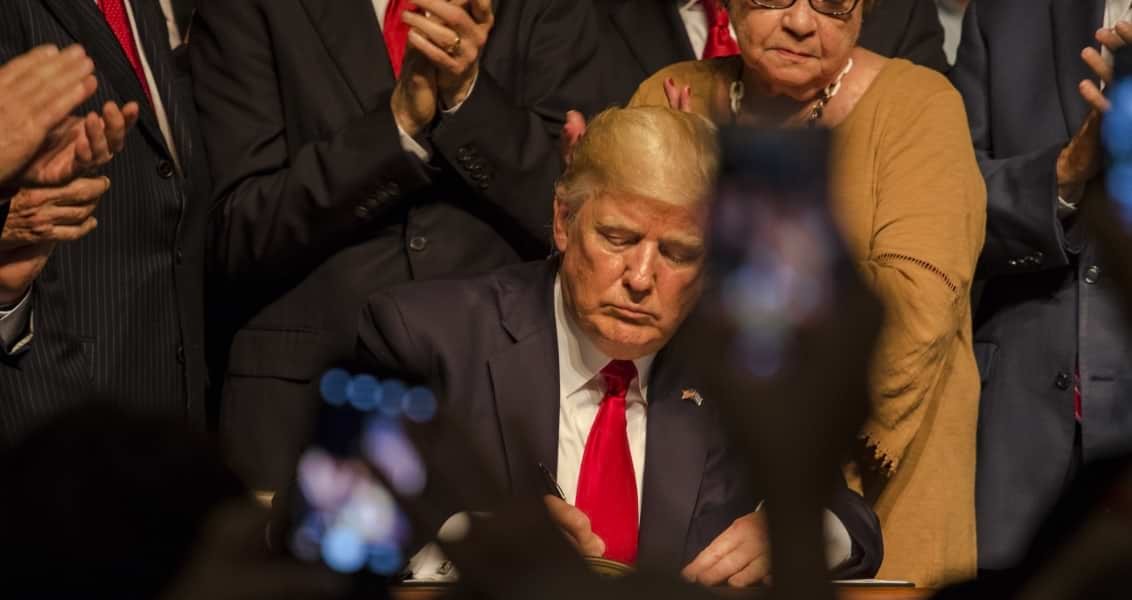
What Can Trump Do With Obama's Playbook?
With or without Obama's policies, it is high time for the Trump administration to do something in the Middle East
Share
Showing complete disregard for civilian casualties, the U.S. Air Force has been bombing Mosul and Raqqa in an effort to finish the job. At this point, hardly anyone knows whether the post-Daesh period will be dominated by the battle over the future of Syria and Iraq – which set in motion processes that could lead both country's to disintegration.
The first crucial development was a decision by the Kurdistan Regional Government (KRG) to hold an independence referendum on Sept 25. The inclusion of Kirkuk, whose status remains unclear, further complicates the situation. To be clear, this incident not only illustrates that Iraq cannot be governed by federalism, but also signals that Syria cannot have a federal future either.
Meanwhile, there has been increased military activity in eastern and southeastern Syria, as the fight over Deir ez-Zor and the Syria-Iraq border keeps brewing. In an effort to protect the opposition receiving training in Al-Tanf, the U.S. recently bombed the regime forces twice and downed a Syrian SU-22 jet south of Tabqa, which it claimed had dropped bombs near SDF elements on the ground. The fact that the regime forces and the Iranian-backed Shiite militias reunited for the first time since 2012 in Al-Talf at the Syria-Iraq border, despite U.S. assaults, rings alarm bells in Washington. Although the U.S. military moved its High Mobility Artillery Rocket System (HIMARS) from Jordan to southern Syria, it is clear that such tactical moves will not stop the regime or Iran's militias.
Nowadays, U.S. President Donald Trump, who desperately needs a "win" in the fight against Daesh, experiences problems caused by his failure to develop a comprehensive Middle East policy. For the White House, it has become virtually impossible to manage the implications of the Obama administration's policies in Syria and Iraq. The short-term tactical calculations made by Mr. Trump's predecessor significantly strengthened the hands of Russian and Iranian policymakers in the Middle East.
It would appear that the only policy objective on which everyone in Washington - from POTUS to staffers at relevant government agencies - can agree is to isolate Iran. In order to reach this goal, the Americans need a long-term strategy, which could create a new balance of power in the Middle East, as well as good timing. Ironically, Washington's support for the PKK and the People's Protection Units (YPG) alienated Turkey and the Qatar crisis created tensions in the Gulf region that Iran can exploit – which suggests that the Trump administration still doesn't have a coherent strategy.
To be clear, Syria's post-Daesh future and Iran's isolation are deeply intertwined – even though Washington can't seem to move both issues in the same direction. While Mr. Obama ignored Iranian expansionism, President Trump made it clear that he wants to contain and isolate that country. Foreign Policy, however, recently reported that there was confusion in the U.S. capital about the Iranian presence in Syria. Although the White House is pushing for a more aggressive policy regarding Iran, which would involve attacking Shiite militias in southern Syria, the Department of Defense, the Pentagon and the State Department have raised objections citing the risk of a dangerous confrontation with Iran if the U.S. opens a new front against Tehran's proxies. What they ultimately fear is that the U.S. forces on the ground could be targeted by Iranian-backed armed groups in Syria and Iraq.
It should be clear by now that the Trump administration can't contain Iran by making minor changes to his predecessor's policies on Syria, Iraq and Daesh. As a matter of fact, Mr. Obama clearly wanted to re-integrate Iran into the international system – as opposed to deepen Tehran's isolation. As such, it's not realistic to assume that Obama's leftovers or tactical attacks can break a 40-year resistance front.
The Trump administration has to make a decision. If the U.S. isn't prepared to make an additional military commitment to Syria, the current course will lead to either the disintegration of Iraq and Syria or the consolidation of the Iranian empire across Iraq, Syria and Lebanon. Nor is it possible to unite the Arabs against Iran with cheap ploys like the Qatar crisis. At this rate, President Trump will fail to contain Iran – if he sticks to the Obama playbook anyway.
[Daily Sabah, June 21, 2017]
Tags »
Related Articles








